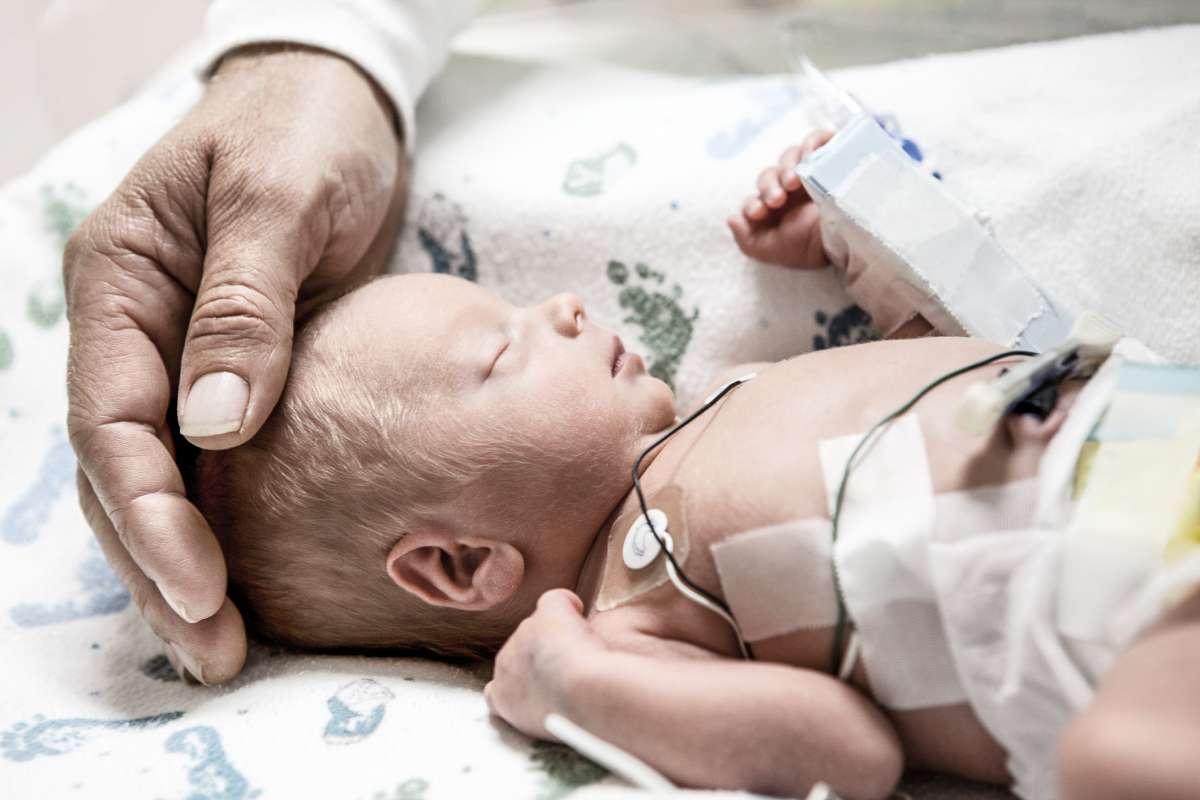The birth of a baby can be an overwhelming experience even when mom and baby are completely healthy. When your baby needs the specialized care of the NICU, it’s entirely normal to have many concerns—and lots of questions.
The month of September is designated as NICU Awareness Month, so we’re taking some time to answer a few commonly asked questions about this type of medical care. Keep reading to learn more.
What is a NICU?
NICU stands for Neonatal Intensive Care Unit. You’re probably familiar with the ICU, which provides intensive care for older children and adults. When newborns and other babies require this level of hands-on care, they receive that care in a NICU, where physicians and other providers have specialty training in the unique needs of babies.
Different NICUs provide different types of care, which are categorized by levels:
- A Level I NICU provides care for healthy babies born between 35 and 40 weeks of gestation.
- A Level II NICU provides care for babies born at or after 32 weeks who weigh more than 3.3 pounds and may require help breathing.
- A Level III NICU provides care for babies born younger than 32 weeks who weigh less than 3.3 pounds, who are critically ill, or who require surgery or help breathing.
- A Level IV NICU provides care for the sickest of babies who require surgery or treatment for birth defects and other health conditions. This level of care is also called “regional,” because it’s typically provided in a large, centrally located hospital.
Northeast Georgia Medical Center (NGMC) has both a Level II and Level III NICU, equipped to provide advanced care for babies born at any stage of gestation. These units have a combined capacity of 52 beds to care for neonates.
What babies need care in the NICU?
Your baby may also need to stay in the NICU for a variety of other reasons, including low birth weight, breathing difficulties, feeding issues, jaundice, difficulties regulating body temperature, bacterial infections, intestinal problems, eye conditions, or heart defects. It’s quite common for twins, triplets, and other multiples to require care in the NICU, since they’re often born prematurely and at a smaller size.
What types of equipment may be used in the NICU?
There’s no doubt about it: The NICU can be an overwhelming environment for many new parents, especially at first. There’s a lot of equipment surrounding very tiny babies, and alarms frequently go off.
Understanding the different types of equipment can help you gain peace of mind when your baby is in the NICU. NICU equipment may include:
- Feeding tubes, which are used to provide nutrition to babies who can’t breastfeed or take a bottle
- Incubators, which are small, temperature-controlled beds enclosed by clear plastic. The incubator helps your baby maintain a proper body temperature.
- Infant warmers, which contain heaters
- IVs, which are used to inject medication and fluids into a vein
- Monitors, which are attached to your baby to track vital signs, including heart rate, blood pressure, blood oxygen, and temperature
- Nasal cannulas, which provide oxygen through the nose for babies who need breathing support but not a ventilator
- Phototherapy lamps, which help treat jaundice using light therapy
- Ventilators, which help support respiration in babies who have difficulty breathing on their own
Depending on the health issues your baby is facing, your little one may also have other lines placed, including central lines to provide medications and fluids or arterial lines to check blood pressure and blood oxygen. These are more advanced care options that may be needed when your baby requires a longer stay in the NICU.
Are we able to care for our baby in the NICU?
There’s no one-size-fits-all answer to this question, which depends on your baby’s health. Your baby’s care team will advise about what you can and can’t do, including holding and feeding your little one.
Parents will be introduced to learning your baby’s schedule in the NICU, providing comfort through physical touch, and participating with the NICU staff in care times. Overall, participating in your baby’s care as much as possible will create a strong bond with your baby and help support their growth and healthy development. For parents, navigating a NICU experience can be frightening and overwhelming. The NICU staff and the Family Support Coordinator can assist and support you through this journey.
How long will our baby be in the NICU?
This answer also varies significantly depending on your baby’s health and why a NICU stay was required in the first place. Some newborns require only a few hours or a few days of care in the NICU to resolve health issues and ensure they’re healthy enough to go home.
Sometimes, such as when a baby is born significantly premature, a longer stay may be needed to ensure proper development and growth. Babies facing major health issues, such as heart defects, may also require a longer stay.
In most cases, babies are discharged from the NICU when health issues resolve enough to allow for at-home care. To “graduate” from the NICU, babies typically need to be breathing well, feeding well, maintaining a normal body temperature, and having no heart rhythm fluctuations or breathing disruptions.
Remember, every baby will be different, and your baby will move at their own pace. Rest assured that they will not be sent home until they are ready and doing well. Your care team, including neonatologists, will be able to provide you with answers specifically based on your child’s health needs.
Learn more
Our Women & Children’s Services team gets to witness life’s most sacred moments every day. Preparing for a delivery? Call 770-525-6572, or click here for more information.



